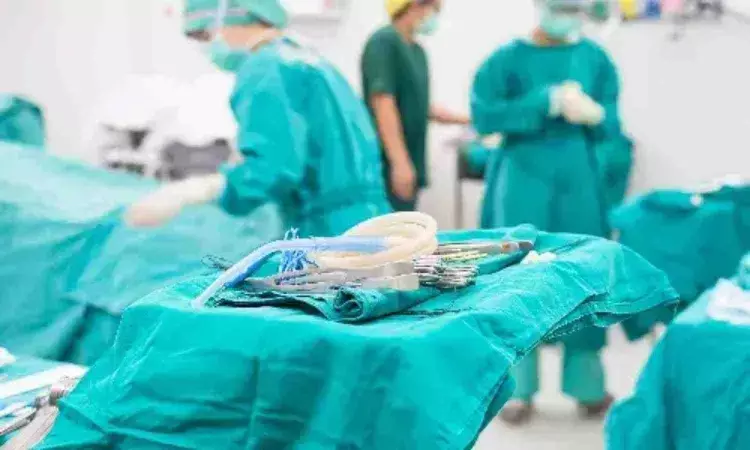- Home
- Medical news & Guidelines
- Anesthesiology
- Cardiology and CTVS
- Critical Care
- Dentistry
- Dermatology
- Diabetes and Endocrinology
- ENT
- Gastroenterology
- Medicine
- Nephrology
- Neurology
- Obstretics-Gynaecology
- Oncology
- Ophthalmology
- Orthopaedics
- Pediatrics-Neonatology
- Psychiatry
- Pulmonology
- Radiology
- Surgery
- Urology
- Laboratory Medicine
- Diet
- Nursing
- Paramedical
- Physiotherapy
- Health news
- Fact Check
- Bone Health Fact Check
- Brain Health Fact Check
- Cancer Related Fact Check
- Child Care Fact Check
- Dental and oral health fact check
- Diabetes and metabolic health fact check
- Diet and Nutrition Fact Check
- Eye and ENT Care Fact Check
- Fitness fact check
- Gut health fact check
- Heart health fact check
- Kidney health fact check
- Medical education fact check
- Men's health fact check
- Respiratory fact check
- Skin and hair care fact check
- Vaccine and Immunization fact check
- Women's health fact check
- AYUSH
- State News
- Andaman and Nicobar Islands
- Andhra Pradesh
- Arunachal Pradesh
- Assam
- Bihar
- Chandigarh
- Chattisgarh
- Dadra and Nagar Haveli
- Daman and Diu
- Delhi
- Goa
- Gujarat
- Haryana
- Himachal Pradesh
- Jammu & Kashmir
- Jharkhand
- Karnataka
- Kerala
- Ladakh
- Lakshadweep
- Madhya Pradesh
- Maharashtra
- Manipur
- Meghalaya
- Mizoram
- Nagaland
- Odisha
- Puducherry
- Punjab
- Rajasthan
- Sikkim
- Tamil Nadu
- Telangana
- Tripura
- Uttar Pradesh
- Uttrakhand
- West Bengal
- Medical Education
- Industry
Persistent postoperative hyperglycemia tied to increased risk of mortality in patients undergoing elective craniotomy: Study

China: A recent study published in the Journal of Neurosurgery has shown an association of moderate and severe persistent postoperative hyperglycemia with an increased mortality risk compared with normoglycemia in patients undergoing an elective craniotomy. The association was observed regardless of whether patients had preoperative hyperglycemia.
The impact of persistent postoperative hyperglycemia after craniotomy has not been explored yet. Considering this, Jialing He, Department of Neurosurgery, West China Hospital, Sichuan University, Chengdu, Sichuan, and colleagues aimed to investigate the hypothesis that persistent postoperative hyperglycemia is associated with mortality in patients undergoing an elective craniotomy.
Adult patients (age ≥ 18 years) undergoing an elective craniotomy between 2011 and 2021 at the West China Hospital, Sichuan University, were included in the study. Peak daily blood glucose values measured within the first seven days following craniotomy were collected.
Persistent hyperglycemia was defined by two or more consecutive serum glucose levels of mild, moderate, or severe hyperglycemia. Severe hyperglycemia, moderate hyperglycemia, mild hyperglycemia, and normoglycemia were defined as glucose values of > 10.0 mmol/L, > 7.8 and ≤ 10.0 mmol/L, 6.1 and ≤ 7.8 mmol/L, and ≤ 6.1 mmol/L, respectively.
A total of 14,907 patients undergoing an elective craniotomy were included. The study led to the following findings:
- In the multivariable analysis, moderate (adjusted OR 3.76) and severe (adjusted OR 3.82) persistent hyperglycemia in patients were associated with higher 30-day mortality compared with normoglycemia. However, this association was not observed in patients with mild hyperglycemia (adjusted OR 1.32).
- The association was observed regardless of whether patients had preoperative hyperglycemia.
- There was no interaction between moderate or severe hyperglycemia and preexisting diabetes.
- When postoperative peak blood glucose values within the first 7 days after craniotomy were evaluated as a continuous variable, for each 1-mmol/L increase in blood glucose, the adjusted OR of 30-day mortality was 1.17.
- Postoperative blood glucose (area under the curve [AUC] = 0.78) was superior to preoperative blood glucose (AUC = 0.65) for predicting mortality.
- Moderate and severe persistent hyperglycemia in patients was associated with an increased risk of deep venous thrombosis (adjusted OR 3.20), myocardial infarction (adjusted OR 4.38), pneumonia (adjusted OR 2.77), and prolonged hospital stays (adjusted OR 1.43).
In conclusion, the study assessed the association of persistent postoperative hyperglycemia with mortality after elective craniotomy. The results showed that in this population, moderate and severe persistent postoperative hyperglycemia were associated with an increased risk of mortality compared with normoglycemia, irrespective of preoperative hyperglycemia.
Reference:
He, Jialing, et al. "Association of Persistent Postoperative Hyperglycemia With Mortality After Elective Craniotomy." Journal of Neurosurgery, vol. 140, no. 4, 2024, pp. 1080-1090.
Dr Kamal Kant Kohli-MBBS, DTCD- a chest specialist with more than 30 years of practice and a flair for writing clinical articles, Dr Kamal Kant Kohli joined Medical Dialogues as a Chief Editor of Medical News. Besides writing articles, as an editor, he proofreads and verifies all the medical content published on Medical Dialogues including those coming from journals, studies,medical conferences,guidelines etc. Email: drkohli@medicaldialogues.in. Contact no. 011-43720751


